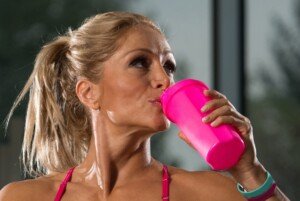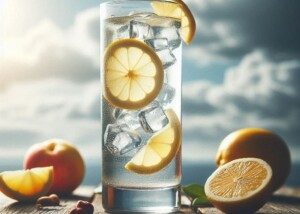Beverages with electrolytes that are targeted towards fitness enthusiasts is a booming business, but does this mean plain water isn’t good enough after your boot camp class or “leg day”?
Chances are, the health club you work out at has a section up front where at least one brand of electrolyte drink is sold.
This can make members think that plain water isn’t sufficient after working out – that their body needs something more, namely electrolytes.
What are electrolytes?
• The human body needs these to survive.
• They are substances that, when dissolved in water, conduct electricity.
• The familiar ones are the minerals sodium, potassium, calcium and magnesium.
What do electrolytes do?
They regulate your nerve and muscle function, help hydrate you, help rebuild tissue damage (the good kind of damage) from exercise, and more.
Electrolytes vs. Plain Water After Exercise
A person who’s read about “electrolyte imbalance” and the symptoms in severe cases may feel a need to guzzle an electrolyte drink after ALL gym workouts.
It’s not uncommon to see people in the free weight area carrying around a bottle of red, green or yellow clear liquid.
These are also seen in group fitness classes.
Makes one wonder how our ancient ancestors – who had to trek for miles in the heat in a single day – survived without mass-produced electrolyte beverages in a plastic bottle.
“Hydrate with water,” says Shana Spence, MS, RDN, CDN, a registered dietitian nutritionist based in New York.
“Surprisingly, people still do not want to drink water,” continues Spence. “There are a million excuses that I hear daily. The ‘bland’ taste is something I hear all the time.
“I always ask people what do they expect water to taste like? It’s water and not supposed to have a taste.”
If water tastes crummy (and this isn’t all that unusual coming from a public drinking fountain at a gym), then you should bring water from home.
If your tap water at home tastes bad, then have a high quality water filter installed, then bottle it and bring to the gym.
Spence continues, “That being said, you can always add fruit to your water (blueberries, strawberries, raspberries) to add that subtle flavor in a healthy way.
“Also adding lemon, cucumber or mint is another way to boost flavor.” Spritz in a little of the natural sweetener Stevia for a nice zing to the flavor.
“But elite athletes hydrate with electrolytes.”
Spence points out, “The common mistake people make is hydrating with Gatorade. They see their favorite athletes drinking it and think they also need the electrolytes.
“Are they practicing the same hours as Serena Williams? Definitely not.
“Yes, athletes do need to replenish their electrolytes lost in massive amounts of sweat. But that one hour of spin class does not qualify — and water will do.”
One time I was watching a Grand Slam tennis event, and Ivan Lendl (top ranked at the time) was being interviewed after a match.
In between words he suddenly raised a bottle of Gatorade to his mouth and chugged.
The “Gatorade” label was facing the camera head-on. This didn’t look like a coincidence.
I suspected he was being endorsed by the Gatorade company and instructed to do this, knowing the whole world would be watching.
Anyways, as a gym rat – whether in the squat rack or group fitness classes — you shouldn’t feel anxious or pressured to rehydrate with electrolytes out of some fear of an electrolyte imbalance.
- Sip water throughout your workout; that should be sufficient.
- Or, after longer time intervals, if that works better for you, drink a good amount of water.
- Try to hydrate with 16 ounces of water after a hard gym workout or group fitness class in which you sweated a lot.
If you have any new-onset symptoms such as muscle spasms, weakness, heart palpitations or nausea, you should consult with your primary care physician, as these can be caused by an electrolyte imbalance.
 Shana Spence of The Nutrition Tea is committed to providing trending information and nutrition facts covering a wide range including nutrition for heart disease and diabetes, pediatric nutrition and healthful lifestyles.
Shana Spence of The Nutrition Tea is committed to providing trending information and nutrition facts covering a wide range including nutrition for heart disease and diabetes, pediatric nutrition and healthful lifestyles.
 Lorra Garrick is a former personal trainer certified through the American Council on Exercise. At Bally Total Fitness she trained women and men of all ages for fat loss, muscle building, fitness and improved health.
Lorra Garrick is a former personal trainer certified through the American Council on Exercise. At Bally Total Fitness she trained women and men of all ages for fat loss, muscle building, fitness and improved health.
.



























